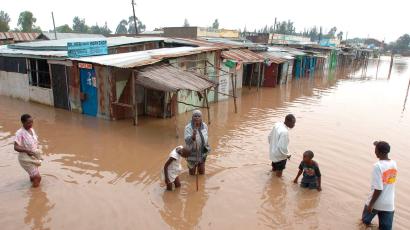Mitigate effects of flood on Nigerians
The National Emergency Management Agency (NEMA), last week warned that 102 Local Government Areas (LGAs) in 28 states are at the risk of flooding this year. The agency added that, 275 LGAs across the 36 states of the federation and the Federal Capital Territory would witness moderate flooding, while some 397 LGAs were at ‘low […]

The National Emergency Management Agency (NEMA), last week warned that 102 Local Government Areas (LGAs) in 28 states are at the risk of flooding this year.
The agency added that, 275 LGAs across the 36 states of the federation and the Federal Capital Territory would witness moderate flooding, while some 397 LGAs were at ‘low probable flood risk.’
Alerts about floods is an annual ritual in Nigeria, an indication that the Nigerian Meteorological Services (NiMET) is equipped to predict the level of rainfall in all parts of the country for, at least, six months ahead.
However, in the last few years, such predictions have been of low benefit to Nigerians as steps to mitigate the negative impacts of predicted floods were hardly taken by the government.
The federal government provides relief materials to victims of floods, but from Nigeria’s experiences over the years, both federal and state governments would need to do more, if the country must benefit from annual flood alerts by NiMET.
Every year, in spite of NiMET’s alerts, millions of Nigerians are displaced by floods, while victims die in their numbers.
For instance, in 2012, floods killed 363 people and displaced two million across 30 states.
In 2018, some 200 persons lost their lives to floods and over one million persons were displaced.
Last year, between April 10 and September 7, 2019, the country recorded a cumulative death of 95 people, many of them women and children, while some 722,741 people were displaced.
It is unfortunate that after the experience the country had in 2012, and in spite of all the promises by the government to deal with the situation, the country still records such deaths from floods.
In many countries, deaths from floods are reduced to the minimal.
For instance, for 2020, Japan evacuated over one million persons from their homes before this year’s devastating floods began.
Their proactive steps reduced deaths and effects of the floods on the people.
For this year, NiMET has predicted that the following states would be severely affected by floods: Borno, Yobe, Gombe, Adamawa, Taraba, Bauchi, Plateau, Nasarawa, Benue, Niger, Kogi, Enugu and Anambra. The rest include Imo, Abia, Rivers, Akwa Ibom, Delta, Edo, Ekiti, Osun, Kwara, Zamfara, Sokoto, Lagos, Ondo, Bayelsa, Kaduna, Oyo, Ogun, Abia, Kano, Kebbi and the Federal Capital Territory.
We call on state governments to make adequate plans to evacuate those who live along flood-prone areas or lowlands to areas where floods would not affect them.
Also, it is important for state governments to engage in pragmatic activities that would prevent floods, instead of theorising and sermonising to the people on how to prevent floods.
For instance, urgent steps should be taken to clear drainages of dirt and debris.
This should not be left to the people; public works department at state and local government levels should be made to carry out this task.
Government should supervise the digging of more water channels, which would direct rain water into rivers, dams or water reservoirs, instead of allowing it to overflow into homes.
Also, unnecessary artificial irrigation, which could lead to flooding should be stopped.
From Nigeria’s previous experiences, it is clear that the cost of flooding is higher than the cost of preventing floods.
Apart from deaths, floods lead to acute food insecurity, as crops are washed away and fertile soil are eroded.
At this time of perennial and intractable insecurity, which has prevented thousands of farmers from planting crops, Nigeria could face acute food shortage if the crops being grown are washed away by floods.
It is for this reason that all hands must be on deck to avert colossal damages by floods this year.
We call on government and non-governmental actors, like religious organisations, business organisations, traditional institutions, and the like, to join in activities that would mitigate the impact of floods in Nigeria this year.
As the saying goes, ‘to be forewarned is to be forearmed.’
